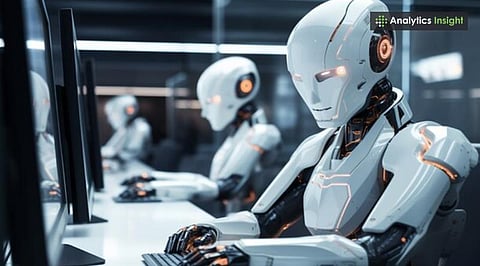

Real-time intelligence, in the AI context, means systems that can process information the moment it is generated and act on it immediately. These are not tools that wait for instructions; they are capable of making decisions as events unfold. At the center of this capability are autonomous AI agents: software programs that think, act, and adapt without needing constant supervision.
They have been quietly integrated into operations across industries, doing work that used to require human teams. Without announcements or hype, they are running parts of businesses already; for instance, they are managing customer interactions, adjusting pricing models, screening fraud, and even writing reports. Their presence is subtle, but their effect is significant.
This kind of intelligence is already working behind the scenes across finance, commerce, security, and operations.
In financial institutions, AI agents pick up on unusual activity in real-time, stopping fraud before transactions go through. E-commerce platforms use them to change prices instantly based on demand, stock levels, and buyer behavior. Cybersecurity teams use agents to catch threats early and respond before damage is done.
Streaming platforms, news apps, and online stores rely on agents to personalize recommendations the second a user takes an action. There is no waiting for a data update or manual intervention; responses are shaped by what is happening now.
These are not experiments. They are part of day-to-day business.
To work at this scale and speed, AI agents depend on strong foundations. First, there is the data infrastructure. Platforms like Kafka and Flink allow data to move and be processed in real time. They keep information flowing with no waiting, no storage delays.
Next, there is the shift from fixed rules to flexible thinking. Earlier systems followed hardcoded instructions. Agents today use models that learn as they work. They do not just follow orders but also interpret, assess, and adjust.
They are also connected. Agents talk to APIs, draw from live databases, and use vector search to understand meaning. They are not operating in isolation; they pull knowledge from across systems to inform what they do next.
With this kind of independence comes the need for clarity. When an AI system handles a customer query, adjusts a price, or approves a loan, the organization still needs to be accountable for the outcome.
This is where transparency matters, not just knowing that a decision was made, but understanding how it happened.
There is also the matter of privacy. Real-time systems handle personal data constantly. Companies must build safeguards into how agents work, not add them after.
And even as agents take over tasks, they do not replace judgment. Human oversight is still needed, especially to review patterns, handle exceptions, and make sure systems are doing what they are supposed to.
Autonomous agents are changing what it means to be productive. They are not replacing everyone; they are removing the repetitive, routine work that clogs up schedules.
Meetings get booked, emails get sorted, reports are compiled, and invoices are processed, without manual input. This frees people up to focus on problems that need reasoning, conversation, or creativity.
What is happening is a quiet redefinition of roles. Jobs are not disappearing entirely, but what is expected from each role is shifting. Some departments may get smaller. Others may move toward more oversight, analysis, and planning. And individuals who learn to work with AI agents will find they can get far more done than before.
Over the next few years, this type of intelligence will not be seen as an extra feature. It will become standard. Companies that delay integrating agents into their operations will likely fall behind, not because they lack vision, but because their competitors moved faster and worked smarter.
AI agents are not replacing the workforce. They are reshaping how work is distributed. And in that process, entire business models will adjust. Some roles will disappear. Others will become central.
Autonomous agents are not loud disruptors, but quiet transformers. They are helping keep systems running efficiently, handling complexity behind the scenes, and changing how businesses operate.
[Disclaimer: The views expressed are solely of the author and Analytics Insight does not necessarily subscribe to it. Analytics Insight shall not be responsible for any damage caused to any person/organization directly or indirectly.]
